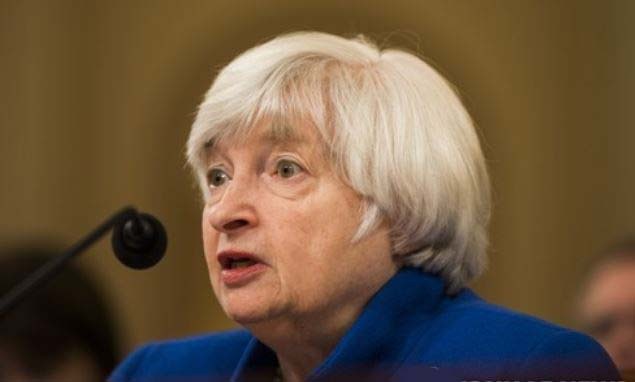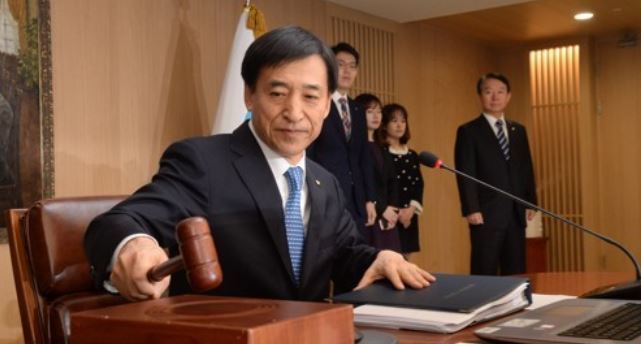The US central bank's latest rate hike has raised the possibility of a reversal of key interests in the world's top economy and South Korea next year that could destabilize the local financial market, analysts said Thursday.
In a widely expected move, the US Federal Reserve hiked interest rates for the third time this year to 1.5 percent Wednesday and retained its forecast for three rate increases in 2018.
With the hike, America's benchmark interest rate has equaled that of South Korea. In November, the Bank of Korea lifted its key rate by a quarter percentage point to 1.5 percent amid clear signs of an economic recovery, ending the 16-month streak of its wait-and-see stance.
The US central bank is widely expected to raise its key interest rate two to four times in 2018 on an economic recovery and a tax overhaul.
The global investment bank Goldman Sachs has recently projected the US Federal Reserve Board will jack up the federal funds rate four times in the coming year, with JP Morgan and Jefferies making the same forecast.
Six investment banking giants -- Bank of America Merrill Lynch, BNP Paribas, Citi, Morgan Stanley, Nomura and Societe Generale -- have projected the Fed to hike the benchmark rate thrice next year. In addition, HSBC has raised its US rate rise forecast to two times from once.
Behind the growing expectations for Fed rate hikes next year are the brisk US economy and the effect of the country's tax reform,
Despite the shock of a devastating hurricane, the world's largest economy expanded 3.3 percent on-year in the July-September quarter on strong corporate investment, higher than an advance estimate of 3 percent.
In a widely expected move, the US Federal Reserve hiked interest rates for the third time this year to 1.5 percent Wednesday and retained its forecast for three rate increases in 2018.
With the hike, America's benchmark interest rate has equaled that of South Korea. In November, the Bank of Korea lifted its key rate by a quarter percentage point to 1.5 percent amid clear signs of an economic recovery, ending the 16-month streak of its wait-and-see stance.
The US central bank is widely expected to raise its key interest rate two to four times in 2018 on an economic recovery and a tax overhaul.
The global investment bank Goldman Sachs has recently projected the US Federal Reserve Board will jack up the federal funds rate four times in the coming year, with JP Morgan and Jefferies making the same forecast.
Six investment banking giants -- Bank of America Merrill Lynch, BNP Paribas, Citi, Morgan Stanley, Nomura and Societe Generale -- have projected the Fed to hike the benchmark rate thrice next year. In addition, HSBC has raised its US rate rise forecast to two times from once.
Behind the growing expectations for Fed rate hikes next year are the brisk US economy and the effect of the country's tax reform,
Despite the shock of a devastating hurricane, the world's largest economy expanded 3.3 percent on-year in the July-September quarter on strong corporate investment, higher than an advance estimate of 3 percent.

In its November meeting, the US central bank upgraded its assessment of the economy's upturn to "solid" from "moderate." The Fed has upgraded its 2018 growth forecast to 2.5 percent from an earlier estimate of 2.1 percent.
Should the tax reform plan be implemented as proposed by the Trump administration, it is projected to increase America's economic growth by up to 0.5 percentage point and lower its jobless rate by 0.2 percentage point.
Also lending weight to the forecast of more rate hikes is the possibility that the rate-setting Federal Open Market Committee may have more hawkish members next year, though two called for a freeze this time citing lower-than-expected inflation.
In contrast, South Korea's central bank is tipped to jack up its benchmark interest rate once or twice in 2018, which would reach 1.75 percent to 2 percent at the end of next year.
Goldman Sachs, Bank of America Merrill Lynch and Barclays have forecast two rate hikes, while Nomura, JP Morgan and HSBC predicted one.
The state-run Korea Development Institute has recently said there is ample room for the BOK to lower interest rates next year in light of the country's low consumer inflation.
South Korea's consumer prices advanced 1.3 percent on-year in November, the slowest pace in 11 months. They were down 0.5 percentage point from October.
"The BOK is expected to cut interest rates one to two times next year, fewer than those in the US," said Kim Cheon-gu, a senior researcher at Hyundai Research Institute. "Given recent remarks by the BOK chief and the current pace of economic growth, there is a low possibility of raising the key rate in the first quarter."

In a new conference following the November policy meeting, BOK Gov. Lee Ju-yeol said, "(The central bank) would make a prudent decision."
Given the Fed's hawkish stance, market watchers said, America's benchmark interest rate may start to hover above South Korea's base rate sometime during the second half of next year, marking the first reversal of their key rates in 11 years.
Such a situation is feared to come as a destabilizing factor for Asia's fourth-largest economy as it could result in a sharp capital outflow.
Yet some watchers said that though investors tend to move to higher-rate nations, a rate reversal would not immediately spark a capital outflow that is also affected by other factors, such as sovereign credit ratings and corporate performances.
"Capital flows and South Korea's household debt would bear the brunt of such a scenario," said Kim Yoon-kyung, a senior bond analyst at the Korea Center for International Finance. "But capital flows are influenced by many factors other than interest rate gaps among nations."
Market watchers estimate the bulk of foreign money has come to South Korea for long-term investment with about 7 percent seeking to capitalize on rate gaps.
And there is a low possibility of a capital outflow leading into a foreign exchange crisis in light of South Korea's large foreign reserves and its recent currency swap deal with Canada, they added.
South Korea's foreign exchange reserves reached a fresh record high of US$387.25 billion in November. As of the end of October, South Korea was the world's ninth-largest holder of foreign exchange reserves behind China, Japan, Switzerland, Saudi Arabia, Taiwan, Russia, Hong Kong and India.
In mid-November, South Korea and Canada signed an open-ended currency swap deal in a step to expand bilateral financial exchanges. (Yonhap)







![[KH Explains] How should Korea adjust its trade defenses against Chinese EVs?](http://res.heraldm.com/phpwas/restmb_idxmake.php?idx=644&simg=/content/image/2024/04/15/20240415050562_0.jpg&u=20240415144419)











![[Today’s K-pop] Stray Kids to return soon: report](http://res.heraldm.com/phpwas/restmb_idxmake.php?idx=642&simg=/content/image/2024/04/16/20240416050713_0.jpg&u=)